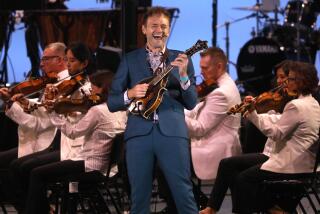Bobby Lyle Live: Another Story
- Share via
NEWPORT BEACH — In performance, at least, Bobby Lyle still has the right balance.
Lyle’s newest album release, “Rhythm Stories,” is gussied up with a bevy of heavy-hitting fusioneers, including bassists Stanley Clarke and Marcus Miller, saxophonists Gerald Albright and Everett Harp and guitarist Paul Jackson Jr. It concentrates, as the name implies, on the beat, with accessible hip-hop tunes and a couple of Stevie Wonder covers. It’s a product more concerned with sales than with artistic achievement.
But Lyle’s appearance Friday at the Hyatt Newporter was nothing like that commercially minded effort. Mixing a variety of forms, Lyle showed why he’s the thinking-person’s jazz fusion artist in a set that was as smart as it was fun.
The live-performance Lyle doesn’t lean too far in any direction as he combines contemporary beats and instrumentation with straight-ahead sensibilities. While most of today’s crossover artists rely too heavily on the rock side of the jazz-rock medium, Lyle lures his listeners with accessible rhythms that bring depth and meaning, not to mention fine musicianship, into his heady mix.
With a small synthesizer perched on top of his grand piano Friday, Lyle presented a tonally smart blend of acoustic and electronic sounds, soloing in detail on the 88s here, providing funky, electric sounds there. Occasionally he would use both in intriguing call-and-response fashion, answering ambitious acoustic runs with tinkling accents from the synthesizer.
He chose “Exotic Love,” one of the sultrier pieces from “Rhythm Stories,” to represent the album. With Cal Bennett stating the theme on soprano saxophone, Lyle provided first steel drum-like, then string-sounding tones from the synthesizer for accompaniment, then switched to sweeping chordal statements as Bennett’s improvisation climaxed. During his own improv, Lyle stuck to acoustic, building on a rotation of locked-hand figures to an intense statement worthy of McCoy Tyner. To close, he returned to the electric keyboard and echoed the steel drum introduction.
Still, he didn’t forget his roots, working solo on Billy Strayhorn’s “Lush Life” in an acoustic effort that was rich with detail. This was followed by an involved bebop-inspired tribute to Dexter Gordon (“Blues for Dexter”) that contained some stately stride piano touches.
Sadly, both pieces, as well as his signature “Ivory Dreams,” were marred by the chop of a police helicopter circling close to the outdoor venue, prompting Lyle to wonder aloud if he should wait for it to leave before continuing. “Sounds like South Central,” someone yelled from the crowd. “South Central? Brother, you’re a long way from home,” Lyle quipped.
(Newport Beach police were called to the hotel Friday to help disperse a crowd, estimated by Hyatt Newporter officials at more than 600, that had gathered for the premiere of a surf-snowboard action film and a scheduled appearance by three rock bands.)
Despite the distraction, the keyboardist’s set was a sterling example of what fusion should be: accessible but intelligent, melodic yet detailed. Here’s hoping that Lyle’s recorded work will return to that form.
Meanwhile, opening act the B Sharp Jazz Quartet improved on tunes pulled mostly from its impressive, eponymously titled release. The acoustic foursome made a strong impression with fine individual efforts that melded into a whole even greater than its parts.
B Sharp extends the mainstream tradition with tunes that feature a tight rhythmic base and components that complement rather than go their own way. The group opened with John Coltrane’s “Blue Trane” before moving through an impressive array of originals, notably pianist Eliot Douglass’ “Panacea,” bassist Reggie Carson’s quirky “Analytical Cubism” and an ambitious work penned by saxophonist Randall Willis and drummer Herb Graham Jr. dubbed “Hoopty.”
Douglass’ blues and bop excursions were particularly satisfying, often developing from spare, wispy lines into full-blown chordal onslaughts. Drummer Graham offered fine accents to the tunes while building his attack proportionately to a soloist’s degree of intensity. Saxophonist Willis, showing chops on tenor, alto and soprano, avoided the sometimes overly repetitious formula he used on the album, instead attacking each tune with a varied bag of color and ideas.
Beneath it all, solid as a concrete fence post, was bassist Carson, whose every note seemed designed to fit perfectly into the overall musical scheme. That’s B Sharp’s greatest strength--that it arrives at one sound, rather than four approaches working at cross-purposes.
More to Read
The biggest entertainment stories
Get our big stories about Hollywood, film, television, music, arts, culture and more right in your inbox as soon as they publish.
You may occasionally receive promotional content from the Los Angeles Times.









